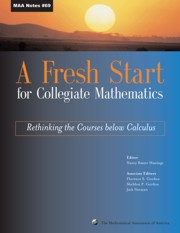Book contents
- Frontmatter
- Preface
- Contents
- Introduction
- Background
- Theme 1 New Visions for Introductory Collegiate Mathematics
- Theme 2 The Transition from High School to College
- Theme 3 The Needs of Other Disciplines
- Theme 4 Student Learning and Research
- Theme 5 Implementation
- Theme 6 Influencing the Mathematics Community
- Ideas and Projects that Work: Part 1
- 30 College Precalculus Can Be a Barrier to Calculus: Integration of Precalculus with Calculus Can Achieve Success
- 31 College Algebra Reform through Interdisciplinary Applications
- 32 Elementary Math Models: College Algebra Topics and a Liberal Arts Approach
- 33 The Case for Labs in Precalculus
- 34 The Fifth Rule: Direct Experience of Mathematics
- Ideas and Projects that Work: Part 2
30 - College Precalculus Can Be a Barrier to Calculus: Integration of Precalculus with Calculus Can Achieve Success
from Ideas and Projects that Work: Part 1
- Frontmatter
- Preface
- Contents
- Introduction
- Background
- Theme 1 New Visions for Introductory Collegiate Mathematics
- Theme 2 The Transition from High School to College
- Theme 3 The Needs of Other Disciplines
- Theme 4 Student Learning and Research
- Theme 5 Implementation
- Theme 6 Influencing the Mathematics Community
- Ideas and Projects that Work: Part 1
- 30 College Precalculus Can Be a Barrier to Calculus: Integration of Precalculus with Calculus Can Achieve Success
- 31 College Algebra Reform through Interdisciplinary Applications
- 32 Elementary Math Models: College Algebra Topics and a Liberal Arts Approach
- 33 The Case for Labs in Precalculus
- 34 The Fifth Rule: Direct Experience of Mathematics
- Ideas and Projects that Work: Part 2
Summary
Introduction
The articles collected in this volume make one fact very clear: precalculus means many things to many people, and serves many different functions. One of the primary functions of a precalculus course (whether in high school or in a college or university setting) is to serve as a preparation for the first course in calculus. It is this “preparing for calculus” course, specifically in the college or university setting, that we assert is failing in its stated purpose. The dismal percentage of those who complete precalculus and continue on to complete the calculus I course makes it clear that something is very wrong. Tinkering with content, technology, and pedagogy may improve the precalculus course, but these repairs do not address several fundamental problems. We discuss here an alternative one-year college course that integrates the review of precalculus topics on a just-in time basis; it has shown documented success in helping a larger number of students succeed in completing calculus I.
The problem and a response
In recent years, as mathematical techniques have gained increasing importance in a wide variety of fields, the requirement of at least one term of calculus has become standard not only for the physical and mathematical sciences, but for many other college majors. This has created a serious problem for those who teach calculus: roughly half the students with this requirement arrive at college inadequately prepared to take calculus. The most standard response to this lack of preparation is to require the completion of a college precalculus course before enrolling in calculus I.
- Type
- Chapter
- Information
- A Fresh Start for Collegiate MathematicsRethinking the Courses below Calculus, pp. 285 - 294Publisher: Mathematical Association of AmericaPrint publication year: 2006
- 2
- Cited by

